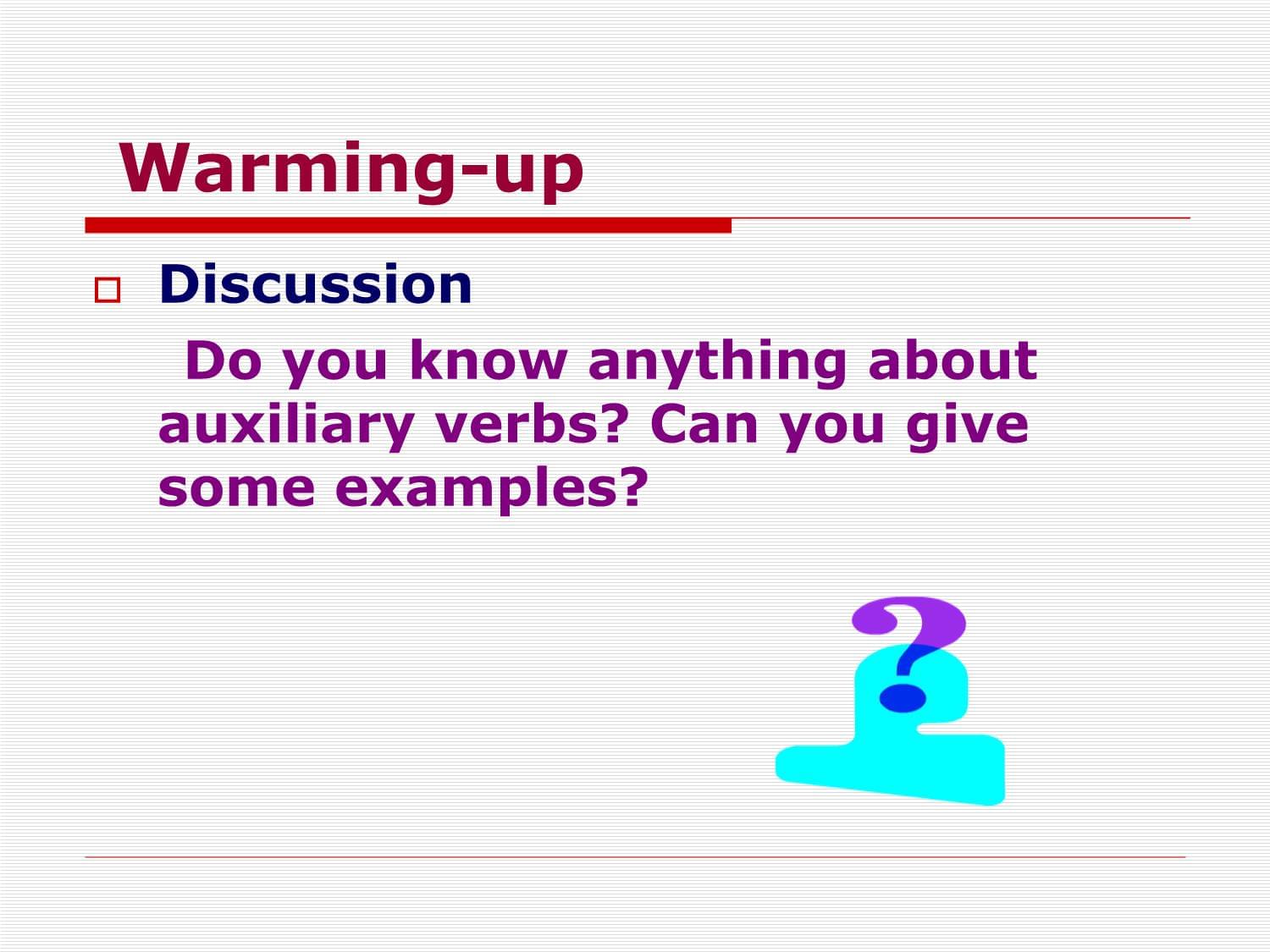




版权说明:本文档由用户提供并上传,收益归属内容提供方,若内容存在侵权,请进行举报或认领
文档简介
Chapter11AuxiliaryVerbsandModalVerbs
Warming-up
Discussion
Doyouknowanythingaboutauxiliaryverbs?Canyougivesomeexamples?
Introduction
ThreemaingroupsofauxiliaryverbsA.be,am,are,is,was,were,been,beingB.have,has,had,havingC.do,does,didTheusageofsomemainauxiliaryverbs
A.be
a.Auxiliaryverbs
1)Invarioustenses
e.g.I’m
seeingafriendoff.Hewasgropinginthedark,sotospeak.Whatwere
youdoingwhenIcalled?TheusageofsomemainauxiliaryverbsA.be
a.Auxiliaryverbs
2)Inpassivevoice
e.g.Smokingisnotallowedinthisbuilding.Hewaspenalizedforafoul.Youarerequestedtogiveaperformance.Thetriphasbeencancelled.
3)Inpassiveforms
e.g.Hehatesbeinginterrupted.Sheisafraidofbeingseen
byherfather.Suchproblemshavetobehandledwithcare.TheusageofsomemainauxiliaryverbsA.be
b.Otherverbs
1)Usedaslink-verb
e.g.Heis(was)
anatheist.
Bealwaysonyourguard.Hehad(has)beeninBeijingforfiveyears.
TheusageofsomemainauxiliaryverbsA.be
b.Otherverbs
2)Usedasintransitiveverbs
e.g.Thepartywillbeinaweek.Whenistheweddingtobe?Whatwillbe,will
be.TheusageofsomemainauxiliaryverbsA.be
c.be+infinitive
1)Toindicatethethingplanedtodo,similarto“begoingto”
e.g.Iam(was)toplay
Juliet.ThePresidentistomakeastatementtomorrow.She
wastohavegotmarriedlastmonth.
2)Thethingthatshouldbedone(should,must,oughtto,haveto,etc.)
e.g.Supposehecomeshere,whatamItotellhim?Youarenottosmokeintheroom.
TheusageofsomemainauxiliaryverbsA.be
c.be+infinitive
3)beabletodosth
e.g.How
amItopaysuchadebt?Notasoundwastobeheard.
4)Thethingthatisduetohappensomeday
e.g.Theworst
isstilltocome.Theysaidgoodbye,littleknowingthey
were
nevertomeetagain.TheusageofsomemainauxiliaryverbsB.have
a.auxiliaryverb
1)Toformperfecttenseandperfectcontinuoustense
e.g.I’veseenthisfilmbefore.Theyhadalreadytold
methenews.Whathasshebeendoingsince?
2)Perfectforms
e.g.I’mpleasedto
havemade
youracquaintance.Iregrettedhavingbeensorudetohim.
Nothavinggotananswer,hewasratherworried.TheusageofsomemainauxiliaryverbsB.haveb.Usedastransitiveverb
1)Toshowone’sbelongings
e.g.Mr.Green
hadlivingwithhimanephewandaniece.Thehousehasfiverooms.I
haveanimpressionthathe’sbeenimproving.TheusageofsomemainauxiliaryverbsB.haveb.Usedastransitiveverb
2)Toshowsomeactionsbyplusnouns(P256)
e.g.havealongwalkhaveadrinkofwater
haveafighthaveabath
3)Tomeaneat,drink,haveillness,etc.
e.g.Theyarehavingfishforsupper.Willyouhaveacigarette?Doyouoftenhavecolds?TheusageofsomemainauxiliaryverbsB.have
c.Toformsomesentencepatterns
1)have+n./pron.+infinitive(bareto)
e.g.I’llbeproudtohaveyoureadit.Iwon’thavehimcheatme.I’mgoingto
haveherlivewithme.TheusageofsomemainauxiliaryverbsB.have
c.Toformsomesentencepatterns
2)have+n./pron.+V.pp
e.g.He’shavingthemrepaired.Thepilothadhisplanehijacked.
3)have+n./pron.+V.ing
e.g.Hetriedtohavehertalking,butnouse.Shesoonhadusalllaughing.
TheusageofsomemainauxiliaryverbsB.havec.Toformsomesentencepatterns
4)have(got)to
e.g.Ihadtowalkveryfasttoovertakeyou.TheselasttwodaysIhavehadtotakearest.Wemayhavetocanceltheplan.
5)havegot(=have)
e.g.Shehasn’tgotabankaccount.I’vegot
oneortwothingstoseeto.Itwasacutepneumoniathatshehadgot.
Theusageofsomemainauxiliaryverbs
C.do
a.auxiliaryverb
1)Toformnegativesentenceandinterrogativesentence
e.g.Doesheworkhere?Heliveshere,
doesn’the?
Didn’tshesingwell?TheusageofsomemainauxiliaryverbsC.doa.auxiliaryverb
2)Toemphasizesthbeforetheverb
e.g.Ididseeherattheparty.
Docome
withus.
3)Toindicatetheactionmentionedbeforetoavoidrepetition
e.g.Tomtalkstoomuch.—Yes,hedoes.Shedoesn’tdrivebutIdo.Hedidn’tseeyou,didhe?TheusageofsomemainauxiliaryverbsC.dob.transitiveverb
1)Addedwithanountoindicatedosth
e.g.I’mdoingsomeresearchonthesubject.Ihaveanumberofthingstodothismorning.Theywanttodobusinesswithus.TheusageofsomemainauxiliaryverbsC.dob.transitiveverb
2)Addedwithgerund
e.g.Hedoessomewritinginhissparetime.Shedidlotsofactingwhenshewasatuniversity.IdidsomereadingbeforeIwenttobed.
3)Addedwithsomenounsindicatingobject
e.g.We
didthejourneyinsixhours.Wedidtwoconcertslastweek.Haveyoudone
yourteeth?
TheusageofsomemainauxiliaryverbsC.doc.intransitiveverb
1)Toindicatethesituationinstudy,work,etc.
e.g.He’sdoingwellatschool.Sheisdoingnicely.Everythinginthegardenisdoingwell.
2)Toindicate“that’senough,that’sOK,suitable,etc.”
e.g.Thisplacewoulddo
foragymnasium.Thatjacketwon’tdoforskiing.TheusageofsomemainauxiliaryverbsD.willa.Inthefuturetensee.g.Iwillgiveyouadefiniteanswertomorrow.
Will
youbetakingyourleaveinSouthAfrica?Bythistimenextyearshewillhavetakenheruniversitydegree.
b.Toindicaterequestintheinterrogativesentencese.g.Will
youtellherthatI’mMrs.Pater?Bringmethepapers,will
you?TheusageofsomemainauxiliaryverbsD.will
c.Usedinvariouspersons
1)Toshowagreement
e.g.Iwillhavenothingtodowiththismatter.Shewon’tsomuchaslookatDavid.
2)Toshowdetermination
e.g.Iwon’t
haveanythingsaidagainsther.I
won’tdoitanymore,Ipromiseyou.TheusageofsomemainauxiliaryverbsD.willc.Usedinvariouspersons
3)Toshowhabit,tendency
e.g.Shewillsitthereforhours,waitingforhersontocomehome.Thesethings
willhappen.Boys
will
beboys.
4)Toshoworder
e.g.You
will
reporttotheheadquartersrighttoday.Noonewillheavetheexaminationroombefore120’clock.
5)Toshowguess
e.g.Themanwiththeumbrella
will
bethePrimeMinister.Iknewhisfather,ProfessorPile—you’ll
haveheardofhim.TheusageofsomemainauxiliaryverbsE.woulda.auxiliaryverb
1)Toformthepastfuturetense(variouspersons)
e.g.Heknewhewouldbelate.Ithoughtshewould
belookingafteryou.FromhertriptoParis,shewould
returnonMondaymorning.
2)Toaskforadvice,requeststh.politely
e.g.Would
youkindlysendmehisaddress?Let’sfixaday.WouldSaturdaynightsuityou?Howdoyouthinkshe
wouldfeel?TheusageofsomemainauxiliaryverbsE.wouldb.subjunctivemood
1)Sentencesofunrealcondition
e.g.Ifweweremen,wewouldbedoingsomethingnow.Hewouldbedelightedifyouwenttoseehim.TheusageofsomemainauxiliaryverbsE.wouldb.subjunctivemood
2)Sentencesofimpliedcondition
e.g.She’dbestupidnottoaccept.Intheolddaysshewouldhave
argued.
3)Otherconditions
e.g.Iwishthesunwouldcomeout.Sheburnedtheletterssothatherhusbandwouldneverreadthem.TheusageofsomemainauxiliaryverbsE.would
c.usedinpastconditions,toshow“agreement”
e.g.Shejustwouldn’tdowhatIaskedher.Theyhadtodothatwhetherthey
would
ornot.
d.thepasthabitualactions
e.g.Whenhewasyounghewouldoftenwalkinthesewoods.He’dalwaysbethefirsttooffertohelp.TheusageofsomemainauxiliaryverbsE.would
e.toshowguess
e.g.I’d
sayshe’sabout40.Iwouldimaginethejourneywilltakeaboutanhour.Thepersonyoumentionedwouldbeherfather.
f.somestructures
e.g.Wherewould
you
like
tosit?I’d
hate
toleaveyou.I’d
prefertogobyplane.I’d
ratherhavetheblueone.F.shalla.auxiliaryverb
1)Mainlyusedinthefirstpersontoforminterrogativesentencestoaskforadvice
e.g.Whattimeshall
Icome?Whereshall
wegoforourholiday?Let’slookatitagain,
shallwe?TheusageofsomemainauxiliaryverbsTheusageofsomemainauxiliaryverbsF.shalla.auxiliaryverb
2)UsedinthepositivesentenceandnegativesentenceinBritishEnglishtoformthefuturetense
e.g.Ishallbeveryhappytoseehimagain.Weshan’t
bearrivinguntilteno’clock.
b.Toshow“regulation,promise,order,etc.”inliterarywordsinBritishEnglish
e.g.Ishallwritetoyouattheendofthemonth.Ifyoureallywantapony,youshallhaveone.TheusageofsomemainauxiliaryverbsG.should
a.auxiliaryverb
InBritishEnglish,usedinthefirstpersontoformpastfuturetense
e.g.Ishould(would)
bemostgratefulifyoucoulddoitforme.IneverthoughtIshould(would)seeyouagain.
b.Modalverb
e.g.Sheconsideredhowsheshould
answer.You
should
trythatnewrestaurant.
Should
Itryagain?TheusageofsomemainauxiliaryverbsG.should
c.Usedincertainsentencestoshowpolitemood
e.g.Ishouldliketophonemylawyer.Weshouldbegratefulforyourhelp.TherearealotofthingsIshouldhavelikedtoaskyou.
d.Toformpredicateinsomeobjectclauses
e.g.Sheadvisedthatweshouldkeepthegatelocked.HearrangedthatI
shouldgoabroad.Shedeterminedthatheshouldstudymusic.TheusageofsomemainauxiliaryverbsG.should
e.Toformpredicateinsomesubjectclausese.g.Itisadvisablethateveryone
shouldhave
amap.Itisbetterthathe
shouldhear
fromyou.
Itisonlyrightthatshe
shouldhave
ashare.
f.Sometimesusedinsomesubordinateclauseseveninthemainclausestohavethecolorofaffection
e.g.It’squeerthatyou
shouldbe
sodifferentfromJane.
Ifinditquiteastonishingthathe
shouldbe
sorudetoyou.
Why
should
he
haveasked
yousuchaquestion?TheusageofsomemainauxiliaryverbsG.should
g.Usedinsentencesofunrealconditione.g.IfIwasaskedtoworkonSundayIshouldresign.IshouldnothavelaughedifIhadthoughtyouwereserious.Weshouldn’thavesucceededwithoutourhelp.Icouldpersuadehertomakeroomforyoushould
itbe
necessary.Ifyou
shouldbepassing,docomeandseeus.TheusageofsomemainauxiliaryverbsG.should
h.Insomeadverbialclausesintroducedby“incase,sothat,lest,etc.”e.g.Hereisashillingincaseyoushouldneedit.Hewasterrifiedlestheshouldslipontheicyrocks.Shehiditunderthepillowsothatheshouldnot
seeit.
i.Toindicateguesse.g.Heshouldhavearrivedbynow.Ishouldsayshe’soverforty.
TheusageofmodalverbsA.Can
Itisusedtoindicatethepresentorfuturesituations.
a.ability(beabletodosth)e.g.Shecanrunveryfast.Ican’tpayyoutoday.Canyouwaittilltomorrow?
b.possibilitye.g.Canyouhelpmewiththebox?I’mafraidIcan’tgowithyou.TheusageofmodalverbsA.Can
c.sometimesexistthedescribedsituatione.g.Youcanbeveryannoying.Scotlandcanbeverycold.
d.possible(usedinnegativeandinterrogativesentences)e.g.Surelyyoucan’tbehungry.You’veonlyjusthadlunch.There’ssomeoneoutside—Whocanitbe?
e.permittodosth.(similartomay)e.g.Youcan(may)takethebookhome.Youcan’tsmokehere.TheusageofmodalverbsB.Could
a.Usedasthepastformofcan,indicatingthepastsituation
1)ability
e.g.IcoulddriveacarbeforeIleftschool.Shecouldn’tanswertheteacher’squestion.
2)possibility
e.g.Itwassodarkwecouldseenothing.Hecouldbeprettynaughtywhenhewasachild.TheusageofmodalverbsB.Could
b.Tosubstitute“can”,indicatingthepresentsituation
1)topolitelyaskforrequirements,idea,suggestion,etc.
e.g.Couldyoushowmetheway?Icoulddoitnowifyoulike.
2)usedininterrogativeandnegativesentencestoshowsurprise,disbelief,etc.
e.g.Howcouldyoubesocareless?Icouldn’thaveleftitonthebus.TheusageofmodalverbsB.Could
c.Usedinthesentencesofunrealconditione.g.Youcouldgetintouniversityifyouapplied.IcouldhaveearnedsomethingifIhadmeantto.
d.could+have+V.pp,indicatingthepastsituation
1)indicatepossible/impossibleatthattimee.g.Themoneyhasdisappeared!Who
couldhavetaken
it?
Don’tworry—they
couldhave
justforgotten
tophone.TheusageofmodalverbsB.Couldd.could+have+V.pp,indicatingthepastsituation
2)indicateshouldhavedone
e.g.Hecouldhavesentamessage.Theaccidentcouldhavebeenprevented.
3)proposeindirectcriticism
e.g.Youcouldhavebeenmoreconsiderate.Theycouldhaveletmeknowtheyweregoingtobelate.
Theusageofmodalverbs
C.may
a.Toaskquestionsforpermissione.g.MayIuseyourphone?Imayleavenow,mayn’tI?
b.Usedinthedeclarativesentencestoshowwhetheritispermittede.g.Youmayonlyborrowbooksfortwoweeks.Passengersmaycrossbythefootbridge.TheusageofmodalverbsC.may
c.Toshowpossibilitye.g.Annamay
knowTom’saddress.Hemayhavegoneabroad.
d.Usedinsomeadverbialclausese.g.Speakclearlysothattheymayunderstandyou.Howevermuchshemaydesireit,shecan’texpresshersympatheticfeelings.
e.Toshowwishe.g.Mayyoubehappy!
Longmayshelivetoenjoyhergoodfortune!
TheusageofmodalverbsC.may
f.Usedinsomeidioms
1)mayaswell
e.g.Youmayaswellbringmeachocolatetoo.
2)may…but
e.g.Oxfordmayhavechangedalotinrecentyears,butit’sstillabeautifulcity.
3)maywell…
e.g.Hisappearancehaschangedsomuchthatyoumaywellnotrecognizehim.TheusageofmodalverbsD.might
a.Usedasthepastformof“may”
1)toshowpermission
e.g.IaskedifImightgohomehalfanhourearliertoday.
2)toexpresspossibility
e.g.Hesaidhemightbelate.
3)usedinsomeadverbialclauses
e.g.Shewasnotallowedtogotobed,lestshemightbeneeded.TheusageofmodalverbsD.might
b.Tosubstitutemay,indicatingpresentsituations
1)toexpresspermissione.g.Inthatcaseyoumightbringyourfathertolivewithus.
2)toexpresspossibilitye.g.Hemighthavegonehome.
c.Usedinthesentencesofunrealconditione.g.IfIhadknownthefilmwasaboutWales,Imighthavegonetoseeit.TheusageofmodalverbsD.might
d.Toexpresslightercomplaintorcriticisme.g.Youmighttellmeifyou’regoingtobelate.
e.mightaswelle.g.Youmightaswellphonethecustomerservicedepartmentaboutit.TheusageofmodalverbsE.Must
a.Toexpresscompulsoryrequirements,indicatingpresentorfuturesituationse.g.Youmustcutdownonsmoking.
#“mustn’t”indicatesforbiddenthingse.g.Carsmustnotparkinfrontoftheentrance.
#“hadto”isclearerthan“must”inexpressingthepastsituationse.g.Ihadtogotoseethedentist.Sheaskedhimifshemust(hadto)workovertime.TheusageofmodalverbsE.Must
b.Toexpressexpectatione.g.Theymustbetwins.There’salotofnoisefromnextdoor.Theymustbehavingaparty.
c.shoulddosth.e.g.Youmustseewhattheauthoritieshavetosay.Youmustrecognizethatwecan’tallowsuchbehavior.TheusageofmodalverbsF.ought
a.Toexpress“shoulddosth.”e.g.Yououghttoreadthisbook.It’smarvelous!IknewIoughttowritetoher.
#Perfectform,presentformorpassiveformcanbeusedafter“oughtto”.e.g.Theyoughttohavestoppedatthetrafficlights.Weoughttobeleavingnow.Somethingoughttobedoneaboutit.TheusageofmodalverbsF.ought
b.Toexpressguesse.g.Heoughttobethere(tohavearrived)bynow.WeoughttobehearingfromWendysoon.Theusageofsemi-modalverbsA.need
a.Usedasamodalverb
1)usedinthenegativesentences,meaning“notnecessarytodoso”
e.g.Youneedn’tmaketwocopies.Onewilldo.Weneedn’thavepackedourthickclothes.Theweatherwasreallywarm.Theusageofsemi-modalverbsA.need
a.Usedasamodalverb
2)usedinthesentenceshavingnegativemeaning
e.g.Ineedhardlytellyouthatthejobisdangerous.
Nobodyneedbeafraidofcatchingthedisease.
3)toforminterrogativesentencesorinthesubordinateclausesindicatinginterrogativemeaning
e.g.Needhedoitatonce?Whyneedyougotoday?IwonderifIneedbringmymosquito-net.Idonotseewhyweneeddiscussitfurther.Theusageofsemi-modalverbsA.need
b.Usedasatransitiveverb
1)beforeanounorpronoun
e.g.Alllivingthingsneedwater.Whatweneedissomeproof.
2)beforetheinfinitive
e.g.Doweneedtobuyticketsinadvance?Allyouneedtodois(to)fillinthisform.Theusageofsemi-modalverbsA.need
b.Usedasatransitiveverb
3)beforegerund
e.g.Hishairneededcutting.Thegardendoesn’tneedwatering—itrainedlastnight.
4)beforecomplexobject
e.g.Heneededhiseyestested.Weneedyoutoworkforus.Theusageofsemi-modalverbsB.dare
a.Usedasamodalverb
1)usedinthenegativesentences
e.g.Idaren’taskhertomarryme.Hedoesn’tdare(to)sayanything.
Noone
daredspeakofit.(negativemeaning)Theusageofsemi-modalverbsB.dare
2)usedintheinterrogativesentencesandclausesofcondition
e.g.Iwonderifshedaredcomehome.
Dareyouinterrupthim?Howdarehetakemybicyclewithoutevenasking!
3)usedinthesentencesintroducedby“Idaresay,don’tyoudare”
e.g.Idaresayyou’reright.Don’tyoudaretellmyparentsaboutthis!Theusageofsemi-modalverbsB.dare
b.Usedasatransitiveverb
1)daretodosth.
e.g.Hedarestoaccusemeofdishonesty.Isatattheback,neverdaringtospeak.Theusageofsemi-modalverbsB.dare
b.Usedasatransitiveverb
2)daretofaceortry
e.g.Hewilldareanydanger.Theactressdaredanewwayofplayingthatfamou
温馨提示
- 1. 本站所有资源如无特殊说明,都需要本地电脑安装OFFICE2007和PDF阅读器。图纸软件为CAD,CAXA,PROE,UG,SolidWorks等.压缩文件请下载最新的WinRAR软件解压。
- 2. 本站的文档不包含任何第三方提供的附件图纸等,如果需要附件,请联系上传者。文件的所有权益归上传用户所有。
- 3. 本站RAR压缩包中若带图纸,网页内容里面会有图纸预览,若没有图纸预览就没有图纸。
- 4. 未经权益所有人同意不得将文件中的内容挪作商业或盈利用途。
- 5. 人人文库网仅提供信息存储空间,仅对用户上传内容的表现方式做保护处理,对用户上传分享的文档内容本身不做任何修改或编辑,并不能对任何下载内容负责。
- 6. 下载文件中如有侵权或不适当内容,请与我们联系,我们立即纠正。
- 7. 本站不保证下载资源的准确性、安全性和完整性, 同时也不承担用户因使用这些下载资源对自己和他人造成任何形式的伤害或损失。
最新文档
- 规划工程技术服务合同
- 旅游计划与日程安排表
- 2025-2030年中国鸡大胸肉行业深度研究分析报告
- 2025年软体家具项目深度研究分析报告
- 度幼儿园食品安全保障合同书
- 二手房买卖分期付款合同模板
- 2025-2030年中国单臂异形磨边机行业深度研究分析报告
- 2025年共享单车租赁协议合同范本
- 2025年会议中心音效系统安装合同
- 2025年耗材、配件经销合同8篇
- 第二章-英国学前教育
- 国家职业技能鉴定考试-高级机修钳工题库
- 315国际消费者权益保护日知识讲座课件
- 2023年二手房买卖合同正式版
- 2例不良事件根因分析
- YS/T 269-2008丁基钠(钾)黄药
- GB/T 3808-2018摆锤式冲击试验机的检验
- (完整版)《汽车材料》课程标准
- GB 1523-2013绵羊毛
- 2004年考研英语一真题及答案
- 过程装备控制基础过程装备控制技术及应用

评论
0/150
提交评论